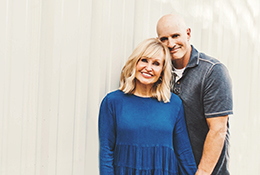
Does Marriage Get Easier?
Does marriage get easier as time goes by? Join Bob Lepine, Ron Deal, Gary Chapman, Juli Slattery, Charlie and Kirstie Dates, and Dave and Ann Wilson for a panel discussion about marriage recorded aboard the 2020 Love Like You Mean It® marriage cruise.
Show Notes
About the Guest
-
- Bonus Audio Q&A about sex and intimacy. (MP3 32.3 MB)
- Book now for the Love Like You Mean It® marriage cruise.
- Find resources from this podcast at https://shop.familylife.com/.
- Check out all that's available on the FamilyLife Podcast Network.
- Have the FamilyLife Today® podcast and resources helped you? Consider becoming a Legacy Partner, a monthly supporter of FamilyLife.
-

Bob Lepine
Bob Lepine is the Lead Pastor at Redeemer Community Church in Little Rock, Arkansas which he helped plant in 2008. He also serves on the Board of Directors for the Great Commission Collective, a church planting ministry connecting more than 150 churches world wide. Bob also hosts Mornings on Family Radio, a network of more than 70 radio stations in the US. He is also well known to radio and podcast listeners as the long-time co-host of FamilyLife Today® and as the on-air announcer for Truth...more
Dave and Ann Wilson
Dave and Ann Wilson are hosts of FamilyLife Today®, FamilyLife’s nationally-syndicated radio program. Dave and Ann have been married for more than 38 years and have spent the last 33 teaching and mentoring couples and parents across the country. They have been featured speakers at FamilyLife’s Weekend to Remember® marriage getaway since 1993 and have also hosted their own marriage conferences across the country. Cofounders of Kensington Church—a national, multicampus churc...more
Gary Chapman
He has degrees from some of the most respected colleges and seminaries. He's written some of the best-selling books of the past decade and appeared on numerous radio and television programs across the country. But Dr. Gary Chapman knows more than just a lot of scholarly theories and practical advice—he knows people. He knows how to relate to people, how to have fun and how to make people laugh, all the while giving practical tools to help improve relationships.
Juli Slattery
Dr. Juli Slattery is a widely known clinical psychologist, author, speaker and broadcast media professional. She's the president and co-founder of Authentic Intimacy. She hosts a podcast called Java With Juli, where she answers tough questions about relationships, marriage, spiritual, emotional and sexual intimacy. She has authored eight books, including 25 Questions You're Afraid to As...more
Ron Deal
Ron L. Deal is one of the most widely read and viewed experts on blended families in the country. He is Director of FamilyLife Blended® for FamilyLife®, founder of Smart Stepfamilies™, and the author and Consulting Editor of the Smart Stepfamily Series of books including the bestselling Building Love Together in Blended Families: The 5 Love Languages® and Becoming Stepfamily Smart (with Dr. Gary Chapman), The Smart Stepfamily: 7 Steps to a Healthy Family, and ...more
Join Bob Lepine, Ron Deal, Gary Chapman, Juli Slattery, Charlie and Kirstie Dates, and Dave and Ann Wilson for a panel discussion about marriage recorded aboard the 2020 Love Like You Mean It® marriage cruise.
Does Marriage Get Easier?
Bob: One of the first questions was: “At what year does marriage become easier?” [Laughter] Let’s find out. Dave and Ann, you’ve been married how long?
Dave: It’ll be 40 years in May.
Bob: Okay; 40 years for you. [Applause]
Dave: Yes.
Bob: Charlie and Kirstie?
Kirstie: It’ll be 14 years in July. [Applause]
Bob: Alright; so still on the front-end of this adventure.
Juli, how long have you and your husband been married?
Juli: Twenty-five years.
Bob: Twenty-five years. [Applause]
And I think you're [Gary] probably the record holder up here. How long for you and your wife?
Gary: Fifty-eight years; it gets a lot easier after forty. [Applause]
Bob: Ron.
Ron: Thirty-four. I’ve got nothing compared to fifty-eight. [Laughter]
Bob: And Mary Ann and I just celebrated 40 years together last year, so we’ve got some experience.
So when does it get easier? I’ll ask the reigning champion: “What year does it get easier?”
Gary: I don’t think it’s a year in particular; obviously, it depends on the individuals. Karolyn and I had a lot of struggles in the early years of our marriage; I mean, really deep struggles.
I will tell you where it turned around for us though. It really made a huge turn is when I finally said to God: “I don’t know what else to do. I’ve done everything I know to do. It’s not getting any better.” As soon as I said that, there came to my mind an image of Jesus, on his knees, washing the feet of His disciples. I heard God say to me, “That’s the problem in your marriage; you do not have the attitude of Christ,”—hit me like a ton of bricks.
My attitude in the early days was something like: “I know how to have a good marriage. If you’ll listen to me, we’ll have one!” She wouldn’t listen to me; I blamed her! From that day, I got a different marriage/a different message. I asked God to change my heart and give me the attitude of Christ. I started asking her questions like: “What can I do to help you?” “How can I make your life easier?” “How can I be a better husband?” She was willing to give me answers. [Laughter]
Looking back on it, she was really teaching me her love language. I didn’t know anything about love languages, but she was teaching me how to love her. When I began to do that and take that attitude, within three months, she started asking me those three questions; huge turning place.
Bob: Do you guys think that the trajectory of marriage is: It’s hard; it’s hard; it’s hard; it gets easier; it gets easier; then it gets hard. Do we go up and down, or do we just gravitate upward?
Ron: There’s no way to predict that. It just all depends on what’s happening in life. Sometimes; struggles in marriage are internal, meaning it’s between the two of us. Sometimes; it's external circumstances or life situations—that bring an unexpected amount of stress, or difficulty, or challenge to our lives—so there’s no way to predict those sorts of seasons. I do think that we’re always working on our marriage, because God’s always using it to work on us.
At some level, just when you think it gets easier, it does get easier in some way; but that opens up an opportunity for the Lord to show you another piece of you that you were not aware of that could use some refinement. Becoming more and more like Jesus is a life-long discipleship journey, and marriage is an act of discipleship. I don’t know that we ever arrive until the day He comes back.
As long as we have that attitude—by the way, I find that relieving—in some ways, you go [timidly], “Great, I’ve got to work at this thing?”—but in other ways, it’s like, “Yes; that’s what I should expect from my God, who loves me so much to help me become more like His Son.”
Bob: And work doesn’t mean just joyless existence.
Ron: Exactly! It’s just the refining fire of learning, and loving, and lessons learned, and repentance.
Dave: I would add—I think it’s what you’re saying—I think it’s real easy to walk into marriage, thinking, “It will be easy.” We actually went to the Weekend to Remember® as an engaged couple, two weeks before our wedding. You know, now we've been speaking at that conference for 30 years; but we sat there, all weekend, literally not taking notes. We just thought: “Oh it can’t be that hard! We love each other. We love Jesus. We’re going into ministry. All these people, taking notes; they don't have a clue! We know how to do this.”
Then we got married; and it was like, “Where’s that manual?” It was the hardest thing we’ve ever done in our lives; but our expectation was that it shouldn’t be that hard because, if you have Jesus, everything’s easy; and that’s not true at all. Jesus makes it possible, but it doesn't make it easy. It’s really, really, really, really, really hard work.
Ann: I like what you said, Ron, because I think what happens is, as we go through life—like when Dave and I were first married, we waited six years to have kids—we thought: “We have this down now; we are good at this.” Then we had kids; and I’m like, “I don’t even like you”; you know?—because you're tired; you’re stressed.
Dave: She didn’t like me way before we had kids. [Laughter]
Ann: But I think—in each season, whether we’re high or we’re low—I think the important thing is that we keep our eyes on Jesus; because He’s our steady; He’s our anchor. He’s the one that keeps us anchored and steady.
Bob: Yes; one of the questions somebody asked—I thought this was a great question—is: “In your marriage, how do you determine whether you should be accepting of your spouse's failings, failures, flaws; or you should be calling them to holiness? At what point do you overlook and at what point are you part of the sanctification process in their lives?”
Charlie, I’ll start with you on that one. How would you counsel a couple in that situation?
Charlie: Thank you for that. Can I say something real fast to the piece we just were on?
Bob: Yes.
Charlie: A common thread that I discern that has helped me is—the Bible says that pride goes before a fall and a haughty spirit before destruction. Marriage requires incredible humility; I think that's a good launching pad here. I am not the Holy Spirit for Kirstie. Although, it’s amazing how often her voice has sounded like the voice of God. [Laughter] I am not that, so I’m not trying to make Kirstie into my image. If I’m honest, I have failed at that. I don’t want to come across to any of you today like I’ve got that nailed down.
I want to make room for Kirstie to fail; I want to create a safe space for her not to get it right without fear of rejection. In doing so, hopefully, as Paul writes, I am loving her like Christ loved the church. Then that also, at times, calls for me to say to her, “Well, you know Dear, we might not want to think of it that way.”
We work at affirming one another before we point out flaws, so we laud and we celebrate. Kirstie does this really good; she does not shoot arrows, so to speak, right when I finish preaching. She has impeccable timing in terms of when to say something hard. The way that I like to say it is—she throws velvet bricks. [Laughter] They are heavy, but they are constructive; but she wraps them in language and a tone that is disarming, one that I can appreciate.
Bob: Kirstie, speak to this subject; can you?
Kirstie: Yes, I’ll say that it’s important, not only what we say, but how we say it; because you’re going to receive my approach before you even hear what I have to say. That goes vice versa. I think that is something we can be mindful of when we’re trying to communicate with each other.
Ron: Maybe we should discern between a minor irritation and a really bad habit and the moral implications of some bad habits.
There’s a Jamaican proverb I love; it says, “Before marriage, keep both eyes open; and after marriage, keep one eye shut.” There are some things we can wash the other’s feet by letting it go, by accommodating that, by being okay with that personality quirk or whatever that thing is that’s a minor irritation.
But there are some things that jeopardize the integrity of the relationship, of the marriage, of the family. Those should not be accommodated. We don't accommodate to sin and, especially, habitual sin. There’s a distinguishing mark there I think.
Bob: The Bible, in Proverbs, says: “It’s a man’s glory to overlook a transgression.” For the majority of transgressions, we’re going to be overlooking; it’s the right thing to do—humble, gracious, overlooking. For those destructive things to a marriage that you’re talking about, then it’s: “Speak the truth in love.” Don’t overlook; but we gently, lovingly confront a spouse in this situation.
Ann, I know you would say—before you gently, lovingly confront your spouse—pray and ask God to give you direction here.
Ann: I would say I was an expert at critiquing Dave. My heart and intent—I feel like they were pure—I was thinking, “I’m going to help you to be better.” No one changes by continually having their flaws pointed out, unless it’s done as a velvet brick.
Bob: Yes.
Ann: However, I had to learn to take control of my tongue and my thoughts; I think it starts here first. I’m a verbal processor; so man, if I think it, I’m going to say it. It took real self-control to say nothing at first; and to go to God first, and pray and ask God, “Should I say anything?” Many times it was, “No,” because “That’s God’s job.”
Dave: Amen.
Ann: Yet, sometimes, if I would say: “God, what should I say?” or “Should I say it?” then I would say: “When should I say it?” and “How should I say it?” I think, if we could practice those things, it could really dramatically affect our marriages and how we view each other.
Dave: I would just add, as her husband, she began speaking life, and it was dramatic; because she was critiquing and saying, “You’re not a good spiritual leader,”—whatever. Then she started saying, “You’re an amazing man of God.” At first, I was like, “No, I’m not; you’ve never said that ever before.” I thought she was lying—and she might have been—but all I know—[Laughter]—all I know is she started saying, “This is who you are.” I felt like, “No, I’m down here.”
Here’s what happened! I’m guessing most men are wired this way, and I bet women are too. When you speak life—and again, it isn’t a lie—it’s like: “I see this; God sees this. This is who you are.” This is what happened to me—I became the man I wasn’t that she said I was; I rose to that. When she critiqued, critiqued, critiqued, I actually got worse; it did not change me.
I would just add this—the other thing that will change your spouse is: “Be like Christ.” Just be a model; show what grace, and forgiveness, and love really looks like; and it’s hard to not want to copy that. You just come home to that; and you’re like, “How can you be like that?” It motivates you to go vertical together, and it changes everything.
Bob: I’ve said to folks: “Most of us are not going to keep competing at something where we’re failing all the time. If we’re losing—if go out and try to play golf, and you’re just not good at golf, you’re not going to say: ‘I’m going to do that again on Saturday. That sounds like fun—to go lose’”; right?
Dave: We keep trying.[Laughter]
Bob: But if our spouse is telling us: “You’re losing,” “You’re losing,” “You’re losing,” what we do is—we say: “Well, I’ll just quit playing. I’m not going to try that anymore.” But if our spouse says, “You know, I saw you do this the other day; that was really good,” we go: “Really? You think there’s hope for us here?” “I think you‘re right on target.”
One of the key themes for FamilyLife® and for our Weekends to Remember® is the pursuit of oneness or intimacy. There’s a natural drift in a relationship toward isolation: “How do we pursue oneness?” A couple of the questions that came in here were about transparency and about isolation/being detached. One wife said, “What can a wife do when she tries to talk to her husband and tells him what she’s feeling or about her fears and his response is nothing.” She feels isolated and detached, and he won’t connect.
Somebody else said: “My husband doesn’t understand what or how to be transparent. How do I explain transparency in a relationship to him?” You hear the longing, which is to be one, and they’re just—there’s some emotional barrier for that. Juli what would you say?
Juli: Yes; well, first of all, I think we’ve got to acknowledge that men are not women. That’s a pretty obvious statement; but sometimes, particularly the way our culture presents marriage—as: “It’s going to meet all your needs,” “This is your soulmate,” “This is your best friend/your girlfriend,”—he’s not your girlfriend.
There's certain aspects of women just wanting to process their feelings and emotions that we’re asking our husband to do something that maybe he’s really not capable of doing. We’re putting him in this situation—we’re asking him to do something that he’s going to fail at. Now, he can grow in that area over time; but he feels like: “Wow; I don’t know what to do when you cry. I can’t fix you.”
I think understanding that you're going to need to have supportive female friends to process some life with and not expect all that to come from your husband, while at the same time, not just writing off intimacy; that it is a journey of growing toward intimacy. For a lot of marriages, women like to process life together; and men like to do life together. Part of his way of connecting may be—not “Let’s stare at each other over a cup of coffee,”—but “Let’s go climb a mountain together, “ “Let’s tackle a job together,”—you may find that, as you’re side by side, doing something together, that he begins to share in a different way and learn to listen in a different way.
Bob: One of the areas that people addressed in their questions has to do with the pace of life: “Balance in our lives seems elusive. How do I be a good mom and a good wife when I’m exhausted all the time?”
Somebody else said: “Our biggest enemy is time—time for God things, time for his things/her things, our things, kid things, family things, work things, fun things, and church things. It doesn’t seem like we’re moving forward in our relationship. How do we fight this enemy of time?” Anybody found any secrets to figuring this out?
Dave: You know, I think that’s one of the answers. You have to stop; there has to be a Sabbath/a rest—a stop in your life that becomes a priority.
I know we run really fast. She said the other day—Ann was in a meeting—she described our life like: “Dave’s sprinting; and I’m holding onto his belt, and my feet are off the air/in the air, and we’re just going.” Here I am, talking about rest and stop; but I think you have to decide priority: “Is Jesus really number one?” and “Is He asking me to take time for Him, and for her, and for us; so that we can be better in that thing?” It’s the priority of saying, “We have to say, ‘No,’ to something.”
Charlie: I have a little bit of experience with this. I ran into a wall about two years ago. Didn't see it coming; just knew it when I hit it. It occurred to me that I had not been honoring the Sabbath. The Sabbath is not just a day to take off; it is the enjoyment of God’s creation.
I don’t have it down; but one of the things that I would recommend is—everybody only has 24 hours in a day and 7 days a week. You’ve got to choose what to be bad at and what to be good at. I’m deciding that everything on my plate or my table is not for me to do. It’s okay for me not to be good at something that there’s an opportunity to be good at, so that I can be great at something else.
We try to model this for our kids; so they got karate—or Charlie has karate on Monday and Wednesdays—Claire has ballet or dance; she’s trying to figure out what she’s going to do with her life at seven. [Laughter] Thursday is piano lesson; Friday is Family Movie Night; and who knows where I am in the country between any of that.
What we’re saying is: “It’s okay to skip karate!” I say that to Miss Pretty: “If they're tired/if we just want to go home, we pay them to teach him karate. We don’t have to do everything that’s on our schedule.” There comes a time when you go, “You know what’s important—staying at home, kicking our feet up tonight; that’s what we're going to do.” Forget who doesn't like if we don’t show up somewhere else. [Applause]
Bob: Kirstie is he getting better?
Kirstie: He is getting better.
Bob: Okay.
Kirstie: But I’ll speak from a wife and mom perspective. A mature mentor of mine told me the idea of balance is kind of this elusive concept. It’s really hard to balance; right?—because things aren’t equal; they don’t have equal weight. But she told me to think about juggling: “Whatever’s in your hand, that’s what you put your attention to.” That's what I’ve tried to do.
If I’ve got the kids: “Okay, I’m going to focus on this; because I can’t focus on this project.” I just keep it moving and, then, that way, you can find some equilibrium if not balance. You don’t feel like you have to keep all the balls in the air at the same time.
Gary: I think all of us struggle with balance. One of the things that’s helped me is to remind myself periodically: “I have time to do everything that is God’s will for my life.” If I really believe that, then I start looking for the things that I need to let go in order to do the things that I really feel like God wants me to do.
[Studio]
Bob: Well, we’ve been listening to a portion of the interaction that took place on board the Love Like You Mean It marriage cruise as the three of us sat down with Dr. Gary Chapman, Ron Deal, Dr. Juli Slattery, Charlie and Kirstie Dates. We were answering questions from people, who were cruising with us, here, a couple of weeks ago.
I should mention—we got a lot of questions about romance, and intimacy, and sex in marriage. If our listeners are interested, we thought, “Rather than have those on our radio program,”—because some of those questions got—
Ann: —pretty raw.
Dave: —pretty real; yes.
Bob: —pretty raw—“you can go to our website, FamilyLifeToday.com. There’s an audio file/a podcast there that you can download that is those questions about romance and intimacy.” Again, go to FamilyLifeToday.com to download that Q&A session if you’d like to.
Ann: Do you think we’ll do a panel next year?
Bob: You know, the feedback we got from folks was: “This was so helpful,” that I would imagine that, when we gather for the 2021 Love Like You Mean It marriage cruise, we’ll put a panel together.
Ann: I hope so.
Bob: We should say, if you want to join us, we would love to have you. We expect the cruise is going to sell out sometime in the next 30-60 days. We’re at 60 percent sold out right now. If you sign up for the cruise between now and March 16, as a FamilyLife Today listener, you will save $300 per couple off your stateroom. We would love to have you join us; go to FamilyLifeToday.com for more information about the ports, about the cost for the staterooms—all of the information is available there. Or call 1-800-FL-TODAY if you’re ready to reserve your spot on the cruise—that’s 1-800-358-6329—1-800-“F” as in family”, “L” as in life, and then word, “TODAY.”
Now, tomorrow, we’re going to hear more from the panel, including questions and answers about expectations in marriage; about forgiveness; “What do you do if your spouse never apologizes?”; and “How do you handle infidelity?—how do you recover from that?—how do you trust again?” That all comes up tomorrow with our panel. I hope you can be back with us for that.
I want to thank our engineer today, Keith Lynch; we got some help from James Youngblood and from Justin Adams. On behalf of our hosts, Dave and Ann Wilson, I’m Bob Lepine. We will see you back tomorrow for another edition of FamilyLife Today.
FamilyLife Today is a production of FamilyLife of Little Rock, Arkansas; a Cru® Ministry. Help for today. Hope for tomorrow.
We are so happy to provide these transcripts to you. However, there is a cost to produce them for our website. If you’ve benefited from the broadcast transcripts, would you consider donating today to help defray the costs?
Copyright © 2020 FamilyLife. All rights reserved.
1
Episodes in this Series


